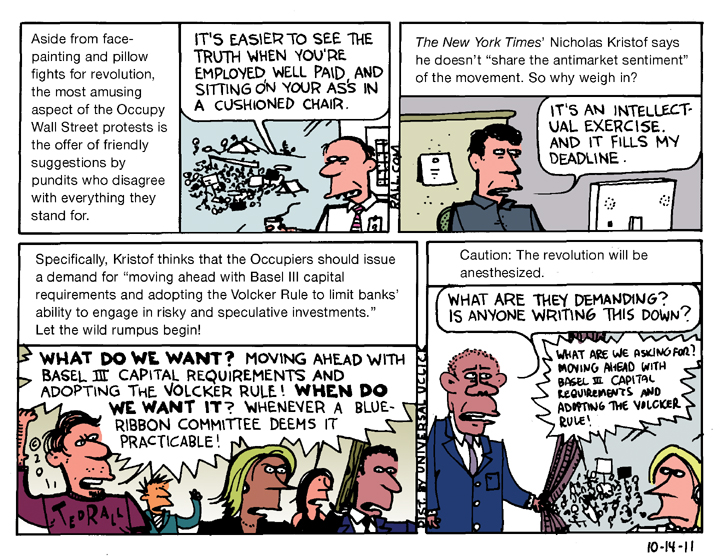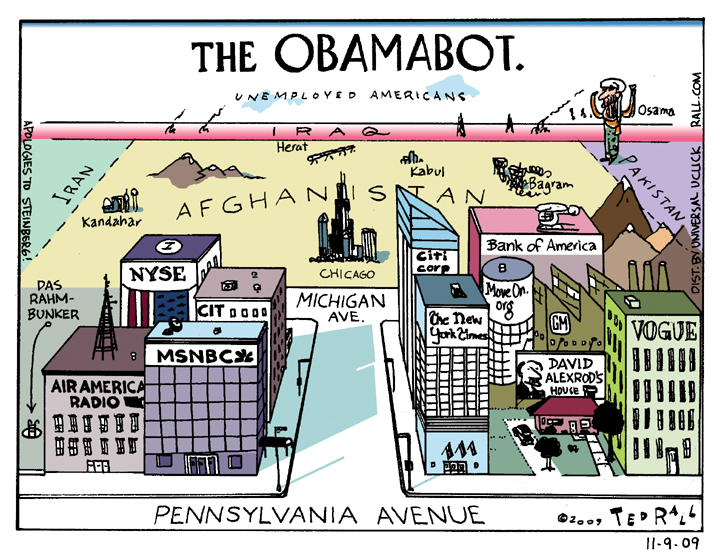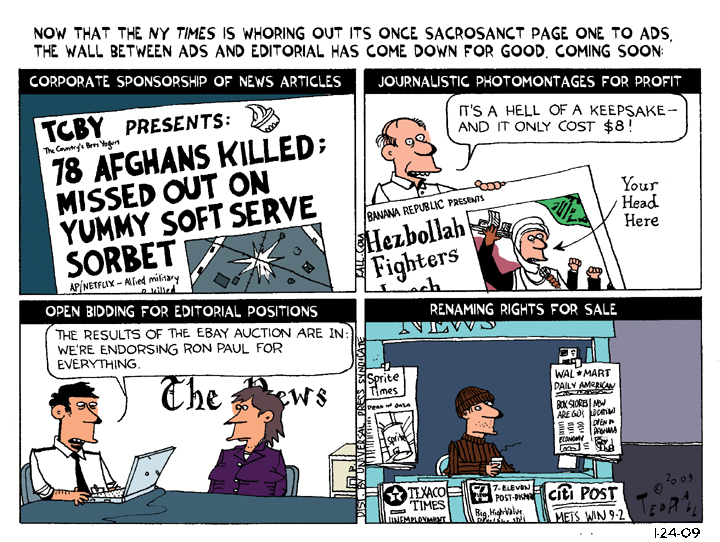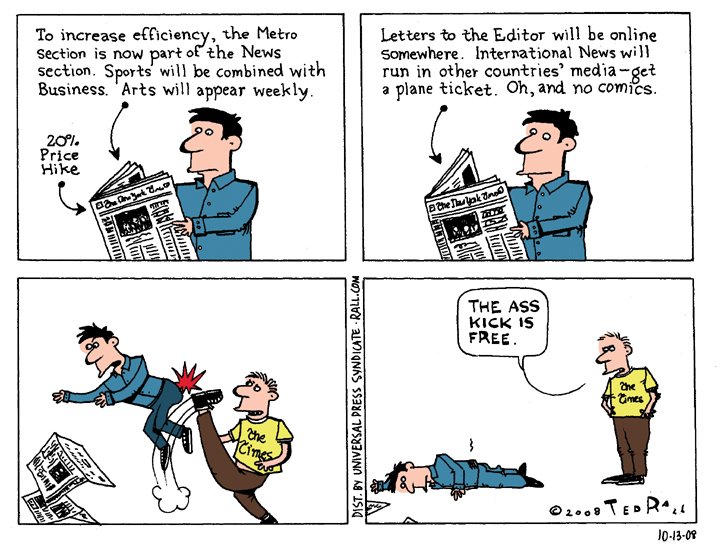Pundits suggest arcane inside the Beltway BS to purist anti-capitalist protesters, and comedy ensues.
No, we are NOT “all BP”.
(This commentary is posted by Susan Stark, a guest here who crashes on Ted’s virtual couch now and then. I haven’t been here in a while, so I thought I’d stop by again.)
Whenever a disaster strikes as a result of corporate malfeasance, there is particular argument that well-meaning people make that annoys me, mainly because it’s not completely true. Take this New York Times letter to the editor:
In “BP’s Responsibility” (editorial, June 12), you say that while a possible total bill of $40 billion for the oil spill in the Gulf of Mexico is breathtaking, the “destruction BP has wrought is even more so.” Like so much commentary on the disaster, this focuses blame wholly on the oil company.
Undoubtedly BP is responsible, but so are all of us who drive cars, travel by plane or consume goods produced and shipped with oil. If we didn’t use it, BP wouldn’t drill for it. Until we recognize that demand for oil is as much the problem as supply, and start to change the way we live to reduce it, environmental destruction is inevitable.
We are all BP.
Martin Brown
—
I beg to differ. This type of argument is something that actually works in the favor of corporations like BP, because it essentially lets them off the hook for what they do. It allows them to say, essentially, that “We are just giving the people what they want, don’t blame us for the result”.
But even if it’s true that we are responsible because we consume oil, we are not all equally responsible. Someone who drives an SUV or any other gas-guzzler is more responsible than someone who takes public transportation. A person who jacks up the thermostat in winter is more responsible than someone who wears extra layers of clothing. If you use air-conditioner rather than a fan, then you are more responsible for these types of disasters than if you chose the fan.
But the people who are the most responsible are the members of the corporate “personhood” of BP. They made the decision to cut safety procedures in order maximize profit. They made the decision to forgo obtaining a kill switch which would have prevented the disaster, merely because it would’ve cost them five hundred grand (which is a drop in the bucket for a multinational oil company like BP).
So yes, we are all responsible, but not equally. BP is the most responsible, and needs to pay for what they did.
Susan
Letter to NYT Book Review
The New York Times reviewed Feiffer’s latest book (a collection of his early Village Voice cartoons) yesterday. The good news is, it was on the cover, it was comics, and Feiffer is great (and a big influence on me). The bad news is, the review was written by someone who obviously doesn’t know much about the subject.
So I’ve written them the following Letter to the Editor. Don’t hold your breath seeing it in print:
To the Editors:
You wouldn’t assign the review of a political memoir to a writer who doesn’t know much about politics. You wouldn’t let a food writer tackle a history book. So why didn’t you respect Jules Feiffer’s collection of early cartoons (“The Explainers”) enough to get a person who knows a lot about political cartooning?David Kamp’s review was favorable, and it ought to have been–“The Explainers” is a great collection of cartoons by a highly influential artist. He clearly did the best he could. But his attempt to fit Feiffer’s work into a broad cultural context was as embarrassing as watching Sarah Palin discuss foreign policy. He was clearly out of his depth–which ill serves your readers.
“You also detect portents of Art Spiegelman, Mark Alan Stamaty and the entire graphic novel genre,” Kamp writes. One can only wince. Hasn’t he been to the graphic novel section of a bookstore? There’s no such thing as a “graphic novel genre”–any more than there is a “newspaper genre.” Graphic novels are a printing format–perfect-bound books with comics in them; they’re novels and novellas and short strips and manga and alternative comix and war correspondency and superheroes and romance and, well, anything.
Anyway, Feiffer’s great influence isn’t on graphic novelists. His example launched scores of wordy, multi-panel cartoonists who work in the alternative weeklies–artists like Tom Tomorrow, Ruben Bolling, Lloyd Dangle and Tim Krieder (none of whose collections ever get reviewed in the Book Review)—as well as text-oriented comic strips from “Doonesbury” to “Bloom County.”
Let me give you a hint. When a reviewer spends two-thirds of the word count paraphrasing and quoting a book’s intro, it’s a hint that he or she doesn’t know what the hell he or she is talking about.
There are a number of fine academics who specialize in the field of political cartooning. For that matter, there are a number of working political cartoonists who–like Feiffer–are superb writers. Why not ask one to review political cartoon books for you?
Contempt for the profession of political cartooning appears to be accelerating at The Times. First is the fact that you’re one of the few big-city daily newspapers that doesn’t employ a staff cartoonist (or two) for your editorial pages. It isn’t lost on cartoonists or their millions of fans that, if every paper followed The Times’ dismal example, there wouldn’t be any Feiffers.
Earlier this year, when The New Yorker’s cover of the Obamas’ “fist bump” sparked controversy, your reporter interviewed late-night comics and comedians. You didn’t bother to interview a single political cartoonist–you know, someone who actually knows about political cartoons. “The Week of Review,” which before 9/11 was a national showcase of some of the nation’s more interesting political cartoons, has been shrunk down, degraded to one-panel “Laugh Lines” presented next to gags by, again, late-night TV comedians.
If there is no place for serious-minded political art in the pages of The Times, how about serious book criticism?
Ted Rall
President, Association of American Editorial Cartoonists
A Compliment I Don’t Deserve, or, “Hi, Coppers!”
The New York Times reports that the New York Police Department monitored this very here “Search and Destroy” website during its manic run-up to the 2004 Republican National Convention, which was held in New York and became infamous as the site of “Little Gitmo”—a system of disused piers transformed into concentration camps where protesters and random passersby were held incommunicado for as long as four days, without being charged.
Here is the Times:
Some highlights from the police intelligence digests:
An Oct. 9, 2003 digest showing that the Police Department shared information with other law enforcement agencies about Bands Against Bush. “The mixing of music and political rhetoric indicates sophisticated organizing skills with a specific agenda,” one police officer wrote.
A Nov. 13, 2003 digest noting the Web site of the editorial cartoonist and activist Ted Rall. “Activists are talking, some with barely hidden glee, about the possibility of violence,” an officer wrote, describing postings on Mr. Rall’s site. [emphasis added]A March 5, 2004 digest citing Aron Kay, a k a “Yippie Pie Man,” who was planning to apply for camping permits so that activists could sleep in Tompkins Square Park during the convention. “The permit application will reportedly be submitted on behalf of an activist group ‘Rainbow Affinity Tribe,’” the officer noted.
The Times story also contains a link to the NYPD dossier on yours truly, the Dreaded “Activist”:
“Ted Rall is a Columbia University graduate who earns a living as a cartoonist/radio host and has been published in the Village voice.[sic]Ted Rall is a nationally known activist figure.”
No wonder our security state can’t find bin Laden: they can’t even get the basics right.
I’m no activist. I marched during the 2003 anti-Iraq War demo in New York, but before that it had been many years since I’d been active in any political organization. (The Dukakis campaign sort of ended my interest in conventional politicking.) Many of my friends are activists, and I admire them for it. Next to them, I’m a mere lump on a log who opines on current events from behind my computer and drafting table.
Also, it wasn’t just stuff posted on my “website,” as they say–it was my syndicated column, which also happens to appear at my website. Saying that this material is from a website is like saying the New York Times is a website, which it is–but it also misses the point.
Another reason they can’t find bin Laden: they’re so worried about the “traitors” in their midst that they’ve lost sight of America’s real enemies.




